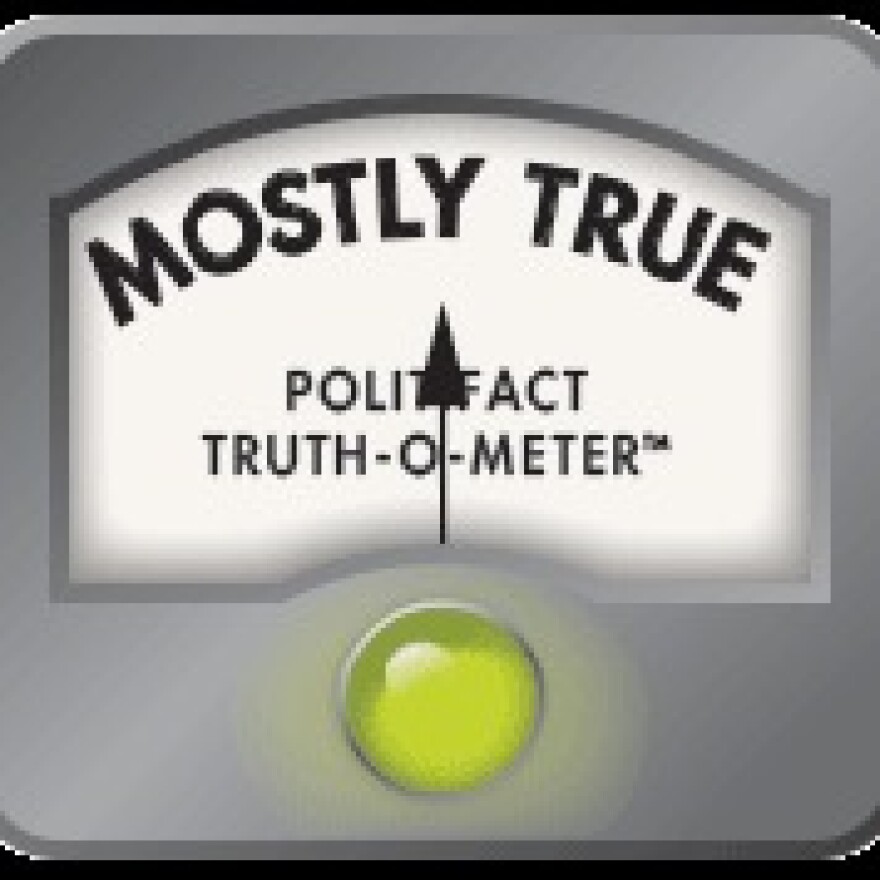Has Gov. Rick Scott really cut taxes 75 times in office, cutting $7.5 billion dollars from the tax rolls? And has that resulted in over a million new jobs being created in Florida? WUSF's Steve Newborn and PolitiFact Florida's Allison Graves look at that claim and another from candidate for Gov. Chris King, who says Hispanics have started three times as many businesses as white men.
Gov. Scott has always had two themes he hammers away at: jobs and cutting taxes. But did he go a bit too far with this claim during a Nov. 9 appearance in Tampa?
"We’ve cut taxes 75 times, cut $7.5 billion worth in taxes, and as a result we’ve added over 1.3 million jobs," Scott said.
Here's PolitiFact Florida's math on that claim:
Scott’s team sent PolitiFact Florida a list of 82 "tax cuts" that reduced government revenues by a combined $7.7 billion. (You can see the list from 2011-16 here; the 2017 list is here.)
As in times past, the list counts Florida's mostly annual sales tax holiday, includes reductions in fees such as lowering the cost to obtain a concealed weapons permit, and counts a measure that stopped an automatic fee increase to obtain a hunting or fishing license. Many of the measures are extremely targeted and many only affect businesses.
However, they do reduce state government revenue, which is why Scott broadly defines them as a tax cut, even if they aren't.
Asked to back up the governor's statement, his office sent us a more nuanced statement about how the tax cuts "helped" contribute to positive economic growth — it did not as directly link the cuts to jobs. 00000174-1251-d47e-a1f7-5275a3800000
"As the governor has said for the past seven years, cutting taxes has helped turn around Florida’s economy, made our state more business-friendly, and has allowed job creators to invest more in creating new opportunities — all of which has helped Florida businesses create more than 1.3 million new jobs," said Scott spokeswoman Kerri Wyland.
No doubt, Scott has cut taxes in his seven years as governor. Our quibble is with the claim that he did it 75 times, which is an inflated statistic.
His claim that those tax cuts created 1.3 million jobs, however, is on shakier ground.
Experts said a bulk of the tax cuts (especially the sales tax holidays and narrow sales tax exemptions) have a minimal effect on the economy.
"What causes businesses to hire more employees is demand for their services," said Jonathan Hamilton, an economic professor at the University of Florida. "The (tax cuts) on Scott’s list all account for a relatively small reduction in their costs."
Looking for more evidence Scott's tax cuts can't solely be the reason the state added 1.3 million jobs? In July 2010, before Scott was elected governor, state economists predicted that the national economic recovery would mean 1 million new jobs for Florida by 2017. That was before Scott was elected or ever cut a tax.
Scott’s claim is partially accurate and overplays the connection to more than 1 million jobs. We rate this claim Half True.
In our next ruling, Chris King, a Democrat who wants to replace Scott in the governor's mansion, said this during a recent forum, hosted by the Florida Democratic Party:
"Well, Hispanic entrepreneurs, those who have immigrated from Spanish-speaking countries, often start three times as many businesses as white males," King said on Oct. 28. "So, we have a need that they fulfill, and this is a governor who is going to communicate that constantly."
Here's PolitiFact Florida's ruling on that claim:

A spokesperson for King’s campaign clarified that he was referring to the rate of growth in the number of businesses started by these demographics, not the raw number of total businesses started.
After some digging, we found a lot of data that speaks to the fact that Hispanics entrepreneurs are opening businesses at a faster rate than the non-Hispanic white population nationwide.
He was comparing the growth of businesses started by Hispanic entrepreneurs, which includes men and women, to white men.
We asked the King campaign to clarify whether the candidate was referring to Hispanic immigrants, that is Hispanics who were not born citizens of the United States, or Hispanic entrepreneurs, which could include immigrants and nonimmigrants. We did not hear back.
But we found that the talking point holds up with either reading.
First, we turned to the Census Bureau’s 2015 American Survey of Entrepreneurs, the most up-to-data from the Bureau.
This survey, which started in 2014, attempts to produce yearly estimates on businesses and business ownership by various demographic groups, and is meant to supplement the Survey of Business Owners, which is only conducted every five years.
The Bureau defines Hispanic-owned businesses as those operating in the United States as 51 percent or more of their ownership to be by individuals of Mexican, Puerto Rican, Cuban or other Hispanic or Latino origin.
Based on the most recent information from the bureau, the number of Hispanic-owned businesses with paid employees (owned by men and women) increased by 4.6 percent from 2014 to 2015, or by about 299,000 to 313,000 businesses.
In contrast, the number of businesses owned by white men grew by about 1 percent between the same time, from 2.91 million to 2.94 million.
So, based on this data, Hispanic-owned businesses grew at a rate about three times faster than white men. But there are some problems with this comparison. Businessman Chris King answers questions during the Florida Democratic Party’s Gubernatorial Candidate Forum on Oct. 28
First off, comparing the growth of businesses started by Hispanic entrepreneurs, which includes men and women, to white men, is not an apples-to-apples comparison.
More important to know is that the Census Bureau hasn’t tabulated a male, non-Hispanic white category. In other words, there’s no way to separate white men and Hispanics who identify as white.
The overall trend — that Hispanic-owned businesses are popping up faster than white non-Hispanic demographics — is correct. The growth rate from 2014 to 2015 for Hispanic-owned businesses was more than three times as much as the growth rate for non-Hispanic whites.
Comparing the number the number of all Hispanic entrepreneurs to white men entrepreneurs is somewhat imperfect, as the tally of businesses owned by white men could be inflated by the businesses started by Hispanics who identify as white.
We rate this claim Mostly True.








